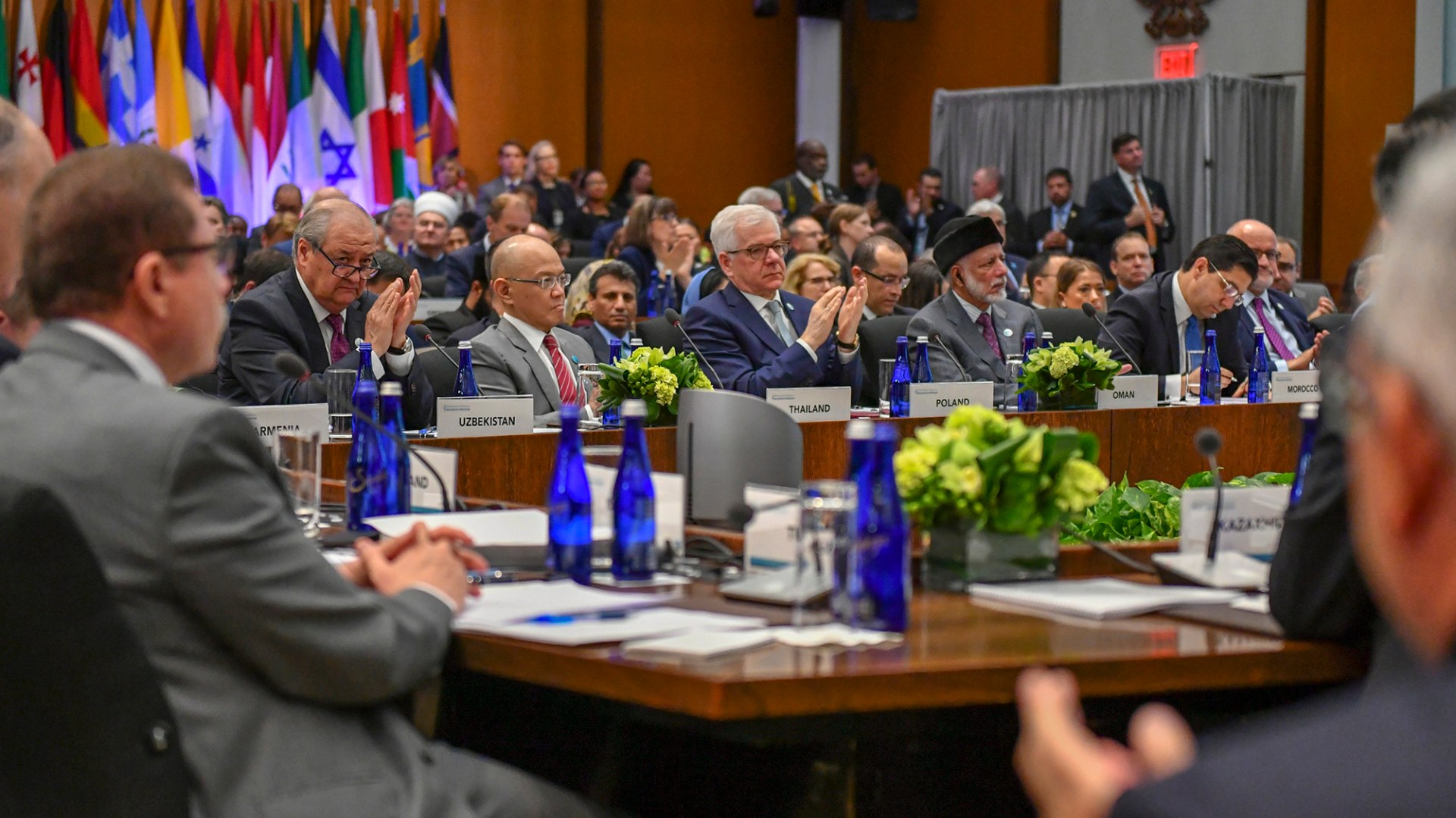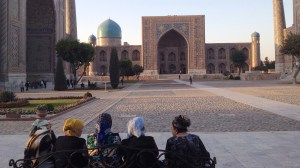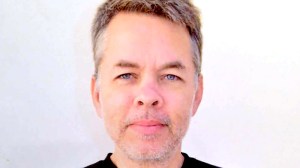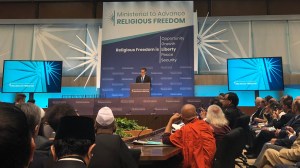In this series

America’s first ministerial for international religious freedom will not be its last.
The State Department and USAID will partner on a new program to ensure that public and private aid can rapidly get to persecuted religious minorities.
And Secretary of State Mike Pompeo revealed today the Potomac Declaration, which proclaims religious freedom to be “a far-reaching, universal, and profound human right that all peoples and nations of good will must defend around the globe” [full text below], as well as an accompanying plan of action.
“These documents reassert the United States’s unwavering commitment to promoting and defending religious freedom,” said Pompeo. “They recommend concrete ways the international community and governments can do more to protect religious freedom and vulnerable religious communities.”
Vice President Mike Pence also reiterated the US commitment to religious freedom on the final day of the unprecedented event in Washington DC.
“The United States is also committed to ensuring that religious freedom and religious pluralism prosper across the Middle East as well. To that end, America is launching a new initiative that will not only deliver additional support to the most vulnerable communities, but we trust that it will also embolden civil society to help stop violence in the future,” said Pence as he announced the establishment of the Genocide Recovery and Persecution Response Program.
The Vice President was quick to point out that the organization would partner with “local faith and community leaders,” and that “this support will flow directly to individuals and households most in need of help.”
Pence mentioned that the Trump administration had already sent more than $110 million to the Middle East. (The funds were announced by Pence in 2017, but have been slow to arrive in Iraqi Kurdistan.)
In the first two days of the ministerial, dozens of civil society leaders from around the globe heard the stories of the religiously persecuted and learned how to better work with the philanthropy sector and US government to secure funds.
On Thursday, delegations from more than 80 countries attended the ministerial. Among them were leaders from Uzbekistan, which the US has designated a Tier 1 Country of Particular Concern (CPC), its harshest classification for countries which it does not believe respect religious freedom. Also present were leaders from some Tier 2 CPC countries: Bahrain, Egypt, Indonesia, Iraq, and Kazakhstan.
Earlier this week, Uzbek officials announced that their nation would begin making significant institutional reforms in the area of religious freedom. At the ministerial today, Bahrain announced that it would be establishing an ambassador-at-large for international religious freedom.
Pompeo praised both nations.
“When religious freedom flourishes, a country flourishes,” he said. “As one example today, we applaud the steps that Uzbekistan is taking towards a more free society. We have great confidence that a degree of religious freedom greater than before will have a positive ripple effect on their country, their society, and the region as well.
“We’ve seen this too in several Gulf countries. As the region has become an economic hub and attracted foreigners from many faiths, several governments have taken important steps. They’ve been wise to permit the construction of places of worship like churches and temples, thus becoming an even more attractive destination for international investment.”
The plight of American pastor Andrew Brunson, who is currently imprisoned in Turkey, was featured prominently at the ministerial. On Tuesday, his daughter testified about her father’s condition and character. On Wednesday, news that Brunson would be moved from prison to house arrest received a standing ovation from the audience. On Thursday, Pence threatened the fellow NATO member if it did not release him.
“If Turkey does not take immediate action to free this innocent man of faith and send him home to America, the United States will impose significant sanctions on Turkey until pastor Andrew Brunson is free,” he said.
Turkey was not the only country Pence named. The Vice President called out countries across the globe, starting with Nicaragua where he accused the Ortega administration of “virtually waging war on the Catholic Church.” He condemned China’s persecution of its Tibetan Buddhists, Uyghur Muslims, and Christians, as well as the actions of its authoritarian neighbor: North Korea.
“While we all hope that relations between the United States and North Korea continue to improve, and we certainly hope that the threat posed by North Korea’s nuclear and ballistic weapons program can be eliminated,” said Pence, “there is no escaping the plain fact that North Korea’s leadership has exacted unparalleled privation and cruelty upon its people for decades.”
Pence also called out Iran. While acknowledging that its Christians, Jews, and Baha’i are all persecuted by its Shia government, he specifically singled out its Sunni Kurd population.
“The people of the United States of America have a message to the long-suffering people of Iran: Even as we stand strong against the threats and malign actions of your leaders in Tehran, know that we are with you,” said Pence. “We pray for you. And we urge you, the good people of Iran, to press on with courage in the cause of freedom and a peaceful future for your people.”
Pence made no mention of the group of about 100 Iranian religious refugees who are currently stranded in Austria after the US invited them to resettle before revoking its offer.
Russia’s Jehovah’s Witnesses, who have been subject to intense persecution in recent years, were also recognized by Pence. “They’re legally banned from practicing their faith,” he said. “Government agents have seized Jehovah Witnesses headquarters near St. Petersburg, raided their prayer halls across the country, and arrested and imprisoned scores of believers.”
The Vice President also called for an end to anti-Semitic attacks in Western Europe.
In his remarks, Pompeo also touted several new State Department projects. One program will bring together religious freedom advocates from around the world for a 10-day project that “will focus on promoting religious pluralism and protecting the rights of religious minorities.” In the fall, the department will host a workshop to support public-private partnerships boosting global religious freedom. Finally, the department is working with several other countries to host regional religious freedom followup conferences.
“We will also be releasing several statements on specific countries–Burma, China, and Iran–and specific issues representing some of the greatest challenges to religious freedom in our world today,” said Pompeo.
While not in attendance, President Donald Trump gave his support to the event.
“The U.S. will continue to promote #ReligiousFreedom around the world,” he tweeted yesterday. “Nations that support religious freedom are far more free, prosperous & peaceful. Great job, @VP, @SecPompeo, @IRF_Ambassador & @StateDept!”
The Universal Declaration of Human Rights proclaims in Article 18 that “everyone has the right to freedom of thought, conscience and religion; this right includes freedom to change his religion or belief, and freedom, either alone or in community with others and in public or private, to manifest his religion or belief in teaching, practice, worship and observance.” The freedom to live out one’s faith is a God-given human right that belongs to everyone. The freedom to seek the divine and act accordingly—including the right of an individual to act consistently with his or her conscience—is at the heart of the human experience. Governments cannot justly take it away. Rather, every nation shares the solemn responsibility to defend and protect religious freedom.
Today, we are far from the ideal declared in the Universal Declaration of Human Rights 70 years ago – that “everyone has the right to freedom of thought, conscience, and religion.” This right is under attack all around the world. Almost 80 percent of the global population reportedly experience severe limitations on this right. Persecution, repression, and discrimination on the basis of religion, belief, or non-belief are a daily reality for too many. It is time to address these challenges directly.
Defending the freedom of religion or belief is the collective responsibility of the global community. Religious freedom is essential for achieving peace and stability within nations and among nations. Where religious freedom is protected, other freedoms – like freedom of expression, association, and peaceful assembly – also flourish. Protections for the free exercise of religion contribute directly to political freedom, economic development, and the rule of law. Where it is absent, we find conflict, instability, and terrorism.
Our world is a better place, too, when religious freedom thrives. Individual and communal religious belief and expression have been essential to the flourishing of societies throughout human history. People of faith play an invaluable role in our communities. Faith and conscience motivates people to promote peace, tolerance, and justice; to help the poor; to care for the sick; to minister to the lonely; to engage in public debates; and to serve their countries.
Religious freedom is a far-reaching, universal, and profound human right that all peoples and nations of good will must defend around the globe. With this in mind, the Chairman of the Ministerial to Advance Religious Freedom declares:
Potomac Declaration Preamble Every person everywhere has the right to freedom of thought, conscience, and religion. Every person has the right to hold any faith or belief, or none at all, and enjoys the freedom to change faith. Religious freedom is universal and inalienable, and states must respect and protect this human right. A person’s conscience is inviolable. The right to freedom of conscience, as set out in international human rights instruments, lies at the heart of religious freedom. Persons are equal based on their shared humanity. There should be no discrimination on account of a person’s religion or belief. Everyone is entitled to equal protection under the law regardless of religious affiliation or lack thereof. Citizenship or the exercise of human rights and fundamental freedoms should not depend on religious identification or heritage. Coercion aimed at forcing a person to adopt a certain religion is inconsistent with and a violation of the right to religious freedom. The threat of physical force or penal sanctions to compel believers or non-believers to adopt different beliefs, to recant their faith, or to reveal their faith is entirely at odds with freedom of religion. Religious freedom applies to all individuals as right-holders. Believers can exercise this right alone or in community with others, and in public or private. While religions do not have human rights themselves, religious communities and their institutions benefit through the human rights enjoyed by their individual members. Persons who belong to faith communities and non-believers alike have the right to participate freely in the public discourse of their respective societies. A state’s establishment of an official religion or traditional faith should not impair religious freedom or foster discrimination towards adherents of other religions or non-believers. The active enjoyment of freedom of religion or belief encompasses many manifestations and a broad range of practices. These can include worship, observance, prayer, practice, teaching, and other activities. Parents and legal guardians have the liberty to ensure the religious and moral education of their children in conformity with their own convictions. Religion plays an important role in humanity’s common history and in societies today. The cultural heritage sites and objects important for past, present, and future religious practices should be preserved and treated with respect.












